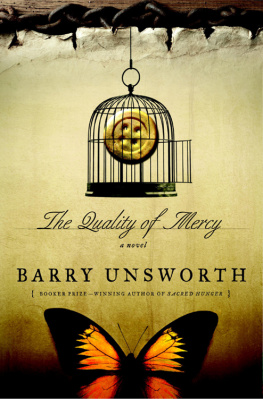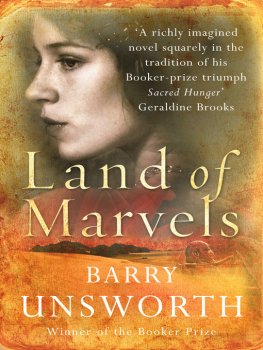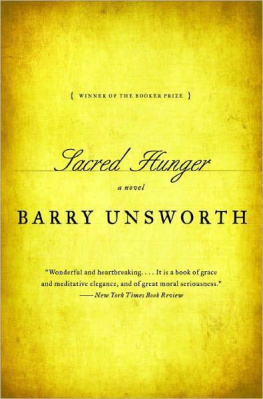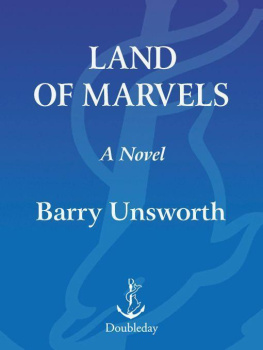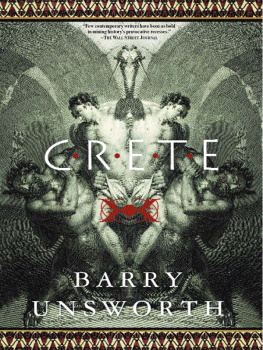Barry Unsworth - The Songs of the Kings
Here you can read online Barry Unsworth - The Songs of the Kings full text of the book (entire story) in english for free. Download pdf and epub, get meaning, cover and reviews about this ebook. year: 2004, publisher: W. W. Norton & Company, genre: Detective and thriller. Description of the work, (preface) as well as reviews are available. Best literature library LitArk.com created for fans of good reading and offers a wide selection of genres:
Romance novel
Science fiction
Adventure
Detective
Science
History
Home and family
Prose
Art
Politics
Computer
Non-fiction
Religion
Business
Children
Humor
Choose a favorite category and find really read worthwhile books. Enjoy immersion in the world of imagination, feel the emotions of the characters or learn something new for yourself, make an fascinating discovery.

- Book:The Songs of the Kings
- Author:
- Publisher:W. W. Norton & Company
- Genre:
- Year:2004
- Rating:5 / 5
- Favourites:Add to favourites
- Your mark:
- 100
- 1
- 2
- 3
- 4
- 5
The Songs of the Kings: summary, description and annotation
We offer to read an annotation, description, summary or preface (depends on what the author of the book "The Songs of the Kings" wrote himself). If you haven't found the necessary information about the book — write in the comments, we will try to find it.
The Songs of the Kings — read online for free the complete book (whole text) full work
Below is the text of the book, divided by pages. System saving the place of the last page read, allows you to conveniently read the book "The Songs of the Kings" online for free, without having to search again every time where you left off. Put a bookmark, and you can go to the page where you finished reading at any time.
Font size:
Interval:
Bookmark:
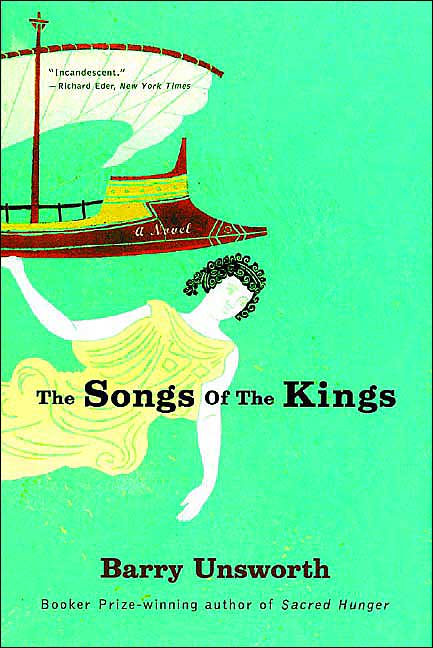
Barry Unsworth
The Songs of the Kings
For Aira with love and thanks
Brilliantly told. Unsworth's treatment has its roots in classical literature but its branches in modernity. This short, sharp tale deserves to be on the shelves of revisionists and purists alike.
ListA sly, profound novel.
Boston GlobeIn terms of pure storytelling power, the purblind poet could not have picked a better vessel to smuggle his great Greek gift into the new millennium.
Time OutIntricate, incandescent, gorgeous. Unsworth is one of the most important British novelists at work today.
New York TimesWe never forget that we are in the hands of a skilled practitioner. Unsworth adroitly conjures the atmosphere of suspicion and subterfuge in the Greek camp.
Literary ReviewA thoroughly contemporary tale of political manoeuvrings and media manipulation. Riveting.
MetroBarry Unsworth was born in 1930 in a mining village in Durham, and he attended Stockton-on-Tees Grammar School and Manchester University. He has spent a number of years in the eastern Mediterranean area and has taught English in Athens and Istanbul. He now lives in Italy. His first novel, The Partnership, was published in 1966. This was followed by The Greeks Have a Word for It (1967); The Hide (1970); Mooncranker's Gift, which received the Heinemann Award for 1973; Pascali's Island, which was shortlisted for the Booker Prize in 1980 and has been filmed; Stone Virgin (1985); Sugar and Rum (1990); The Rage of the Vulture (1991); Sacred Hunger, which was joint winner of the 1992 Booker Prize; Morality Play, which was shortlisted for the 1995 Booker Prize; After Hannibal (1996); Losing Nelson (1999); and The Songs of the Kings (2002). Many of his books are published by Penguin.
Barry Unsworth received an Honorary Doctorate of Letters from the University of Manchester in 1998, and recently taught at the Iowa Writers' Workshop. He is a Fellow of the Royal Society of Literature.
This was the sixth night. He had lain awake through most of it, listening to the wind, the body of the sleeping boy beside him, beset by fear at still not knowing the sender, fear of other failures that might follow from this. The strands of the wind he knew by this time; tensed in concentration, he imagined he could hold them apart, the shrilling high up among the bare rocks, the softer combing in the shrub lower down, the ripple of loose canvas from the tents. Even the very smallest sounds he strained to hear, random sobs and whispers, stirring of grasses, the faint scrape of displaced pebbles along the shore. A wind from the north-east, unheard of at this season, keeping the fleet trapped in these straits at Aulis, and the army with it, waking the men every morning to the unhappy knowledge of some god's displeasure. It came from the direction of Troy, where lay their dreams of conquest. Six days and six nights with no sigh of relenting, though the voices varied. The wind itself seemed to suffer in all its moods, even in its rages pleading to be quieted, to be soothed.
Then, early in the morning of the seventh day, came the summons from Agamemnon. He noted the time just as in those days of his power he noted all such things. Just before sunrise, the wind still there but quieter now, as if for the while exhausted after its riots in the dark. A time disputed between Hecate and Helius, when the world is between states. He was between states himself, as he also noted: neither inside the tent nor out of it, but cross-legged on a cushion at the threshold, watching his acolyte Poimenos, who was still half-asleep, fumbling together a fire for the infusion of mint and honey he had been schooled to prepare. And he was neither clothed nor naked, being dressed only in a loincloth, with a piece of cotton over his shoulder as a shawl. These were things important to remember and interpret; not mortals but gods chose the times.
It was the chief scribe Chasimenos who brought the message, approaching from the rear, appearing suddenly, flanked by soldiers from the King's Guard. At midday, after the fight, Agamemnon would require the presence in his tent of Kalunas, I beg your pardon, Calchas, priest of Apollo.
He smiled saying this, glancing away with eyes so pale as to seem almost colourless in the narrow, bearded face. Calchas read the usual veiled contempt in voice and smile, the elaborate politeness, the stress upon the name, not his own, bestowed on him by the Greeks. Contempt too for his shaven face, his plaited hair, the smudges of kohl that would be still on his eyelids, the amulets worn as a bracelet, contrary to Greek custom. Asian priest of an Asian god without even a cult centre yet established here.
All this was in the looks and the words Calchas was practised in reading such marks. But there was also the fact that this upstart diviner had been granted a shelter of canvas when most of the army spent the nights in the open, finding what cover they could; that he had a boy to share his tent and see to his needs; that he slept on a woollen mat, thickly woven; that he need not reply promptly to a messenger, even one of high rank. It was common knowledge that the King would make no decision, take no step, before Calchas had first scanned the auguries.
Chasimenos stood there waiting, in his long-sleeved tunic of a palace bureaucrat. His smile had withered at the delay. 'The King requires the presence of his seer,' he repeated. The soldiers stood on either side of him, their long spears grounded, their faces heavy with ill-humour at being given escort duties at such an hour, not much after dawn. It was early for the King to send; he would have had another bad night. Chasimenos had no need of an escort for such a small thing as this. But the habit of armed guards had grown in the days they had been here, waiting on the wind. Agamemnon himself never appeared without at least six.
He said, 'Calchas will be honoured beyond honour to kneel at the King's feet. May he live for ever.'
As he spoke he heard the small crackle of the fire, saw the smoke rise straight up in a thin plume. He felt a slight shudder within him, premonition of ill. These calms were dangerous, always brief, cheating the army with hope. There was some quality of danger too in this dawn summons to a meeting he had not been consulted about. Nothing of this showed on his face. He had known how to wait before answering, just as he knew now how to appear unaffected.
He had expected, the answer once given, that the other would quit his presence immediately it was one he had never shown signs of liking, not even back in Mycenae, before they had set out. But Chasimenos remained there, and after a moment, in a tone he tried to make friendlier, said, 'Which of them do you think will win?'
Now at last Calchas could permit himself to show some slight surprise. He was being solicited for an opinion as to who would live and who would die that morning: Stimon the Locrian or Opilmenos the Boeotian, due to fight a duel later on as champions of their respective tribes. 'I have no ideas on the matter,' he said, which was untrue.
'Opilmenos is the stronger and has more battle experience, but they say this Locrian is very quick.'
Something in the tone of this suggested that the scribe might have a stake in the outcome. Calchas had heard from Poimenos, who came and went about the camp on various kinds of foraging expeditions, gathering gossip on the way, that the men were wagering on the result. Though what they could have to wager it was hard to see they possessed nothing but their weapons.
Font size:
Interval:
Bookmark:
Similar books «The Songs of the Kings»
Look at similar books to The Songs of the Kings. We have selected literature similar in name and meaning in the hope of providing readers with more options to find new, interesting, not yet read works.
Discussion, reviews of the book The Songs of the Kings and just readers' own opinions. Leave your comments, write what you think about the work, its meaning or the main characters. Specify what exactly you liked and what you didn't like, and why you think so.

